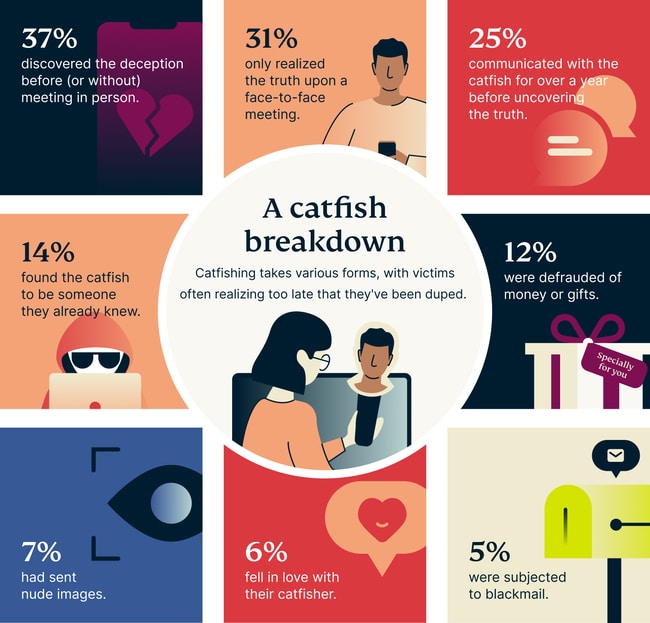An alarming 22% of UK citizens have experienced catfishing, with a worrying 31% of these victims meeting their deceivers in real life, leading to a shocking revelation of their true identities. This information comes from a comprehensive study by ExpressVPN, a prominent consumer privacy and security firm.
The research, involving 2,000 UK participants aged 18 to 50, uncovers the concerning trends in social media and online dating, such as catfishing, AI impersonation, and the dread of revenge porn. The study reveals that close to half (49%) of Brits have grown more aware of catfishing as a direct threat in the past year. For online daters, the fear of being catfished (56%) ranks high among their concerns, surpassed only by the threat of encountering dangerous individuals (62%). Other fears related to online dating include harassment (39%), receipt of unsolicited explicit images (30%), and the exposure of personal details (26%). Intriguingly, a significant proportion of those currently dating online in the UK (54%) admit to experiencing catfishing.
The Home Affairs Committee has recently initiated an inquiry into fraud, particularly focusing on romance scams on social media, highlighting the issue’s severity. ExpressVPN’s survey points out that younger adults, specifically those aged 18-24, are the most prone to catfishing, with 34% reporting such experiences. This is followed by 27% in the 25-34 age group, 18% among 35-44 year-olds, and 7% for those aged 45-50. The survey also uncovers that men are more frequently catfished than women, with respective rates of 24% and 20%.
The survey identifies the platforms with the highest incidence of reported catfishing:
- Facebook: 35%
- Tinder: 31%
- Snapchat: 26%
- Instagram: 25%
- WhatsApp: 16%
- TikTok: 14%
- Bumble: 12%
- Hinge: 8%
- X: 8%
- Reddit: 3%
Of those catfished, 37% realised the truth before meeting in person, but about a third (31%) only discovered the deception upon a face-to-face encounter. A significant 25% engaged with their catfish for over a year before uncovering the truth, and 14% eventually learned that the catfish was a known individual. Sadly, more than 12% of the victims suffered financial losses or were conned into giving gifts.
The psychological toll of catfishing is considerable, often leading to anxiety and depression. Among the affected, 39% felt embarrassment and regret, 36% experienced emotional devastation, 27% were discouraged from seeking new relationships, and 17% developed mental health conditions such as anxiety or depression. Moreover, 16% were reluctant to disclose their experiences to family or friends. Consequently, nearly a third (28%) of Britons now shy away from using social media and dating apps to find partners.
The survey also highlights risky online behaviours among Britons. Approximately 43% have transmitted nude photos, with 15% concerned about potential blackmail, 13% worried about unauthorised distribution, 15% fearful of family discovery, and 10% anxious about their employers finding out. This correlates with a 31% increase in reports to the UK’s Revenge Porn Helpline in 2023, totalling 10,000.
Additionally, 34% of Britons admit to creating fictitious profiles or impersonating others on social and dating platforms. The main reasons include improving dating prospects (10%), investigating whether their partners are unfaithful (9%), or monitoring ex-partners (8%). Over one in four (28%) have utilised AI to enhance their dating or social media profiles, chiefly for photo improvement (15%), biography enhancement (14%), and bettering chat-up lines (12%).
Lauren Hendry Parsons, Privacy Advocate at ExpressVPN, states:
“With the emergence of social media and dating apps came the catfishers—scammers who create a fake persona, complete with attractive photos, to form relationships with strangers predicated on lies. We live so much of our lives online now that it’s not unusual for our first connection with someone to be virtual, including with potential employers, colleagues, bank and retail support staff. There is therefore an element of trust we as individuals have when talking to someone online—a lot more so than a decade ago.
“But sadly there are many bad actors out there preying on this trust, often for financial gain. The growing sophistication of AI and ease of generating false identities has threatened that trust even more. If you suspect you’re getting catfished, report the person to the dating app or social media platform and indicate precisely why you think they’re a possible catfish. There are also several additional security measures you can take when online. For example, using a high-quality VPN can add an extra layer of security to your online interactions. By masking your IP address, a VPN helps protect your location and identity, helping your online activities remain private and secure.”
For more information, visit: https://www.expressvpn.com/




